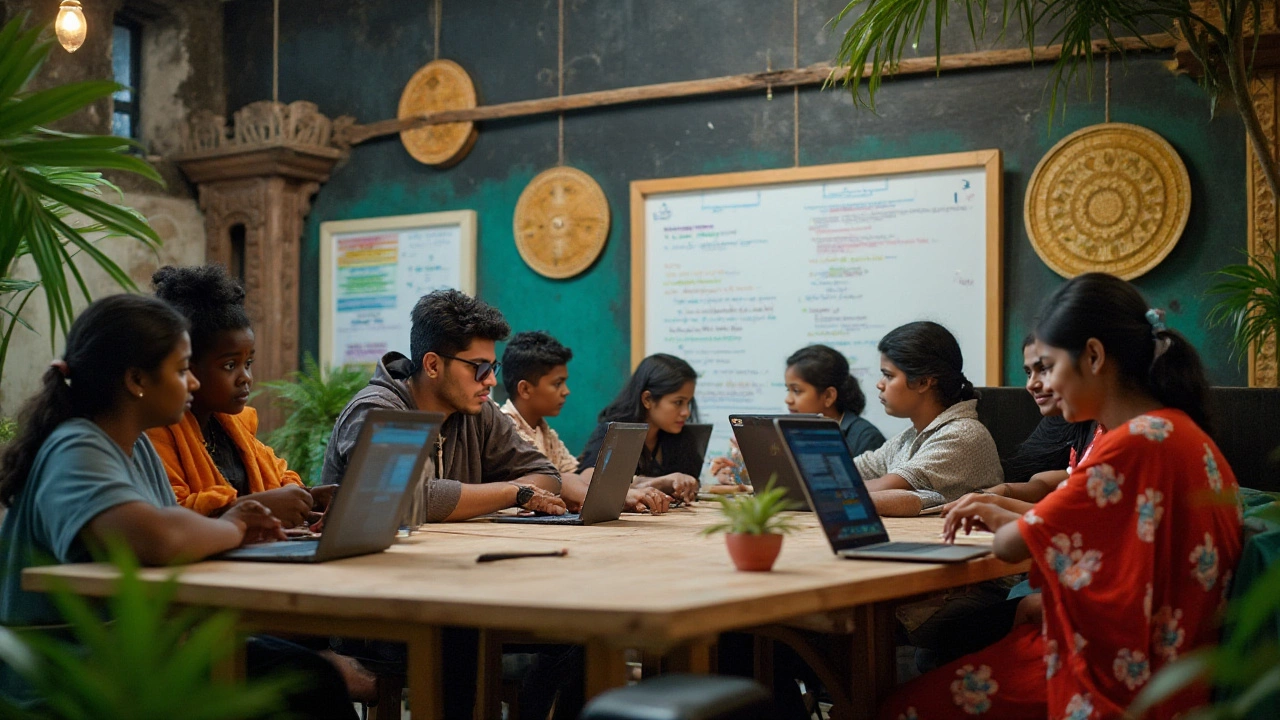In today's digital world, knowing how to code is like having a superpower. It pulls back the curtain on the technology shaping our daily lives. But is it possible to teach yourself this skill? Absolutely, and many have done it successfully.
Starting might seem daunting, but remember - every expert was once a beginner. Getting to grips with the basics, selecting the right learning materials, and consistently practicing are key steps on this journey.
There is no shortage of resources. From online tutorials and coding apps to books and community forums, the tools are available to anyone willing to invest time and effort. With a sprinkle of determination, self-teaching coding can be an exciting adventure.
- Understanding the Basics
- Choosing the Right Resources
- Building Coding Skills
- Finding Motivation and Overcoming Challenges
Understanding the Basics
Diving into the world of coding can seem overwhelming at first glance. However, understanding the foundational elements can clarify the path forward. Coding, also known as programming, is essentially the method of communicating with computers. It uses a set of instructions that the computer follows to perform specific tasks. These instructions are written in a language that computers understand, called a programming language. There are many different languages, each designed with specific uses in mind. Some of the most common ones include Python, JavaScript, and HTML.
Before you even start writing code, it's useful to grasp the concept of algorithms. Algorithms are essentially step-by-step instructions for solving a particular problem. They form the backbone of much coding work. If you can break down a problem into smaller, manageable pieces and then solve each piece, you have grasped the essence of algorithmic thinking. This is a critical skill because complex software is built from these smaller, simpler elements.
When beginning to understand the basics of coding, it's also essential to get acquainted with the various text editors and integrated development environments (IDEs). These tools are where you will spend most of your time writing and testing your code. Choosing the right tool can make a significant difference in your learning curve. If you are just starting, options like Visual Studio Code provide an intuitive interface coupled with extensive features tailored for beginners and pros alike.
In the journey to learn coding basics, grasping the structure of basic programming concepts is key. Such concepts include variables, which store information; loops, which repeat sections of code; and conditions, which allow the code to make decisions. Understanding how these elements fit together to create logical, functioning programs is foundational to mastering any programming language.
It's worth noting that learning to code often involves making mistakes—and that's perfectly okay. Debugging, or finding and fixing bugs or errors in a program, is an integral part of the process, teaching not just problem-solving but resilience. As Steve Jobs once said,
“I think everybody in this country should learn how to program a computer because it teaches you how to think.”This perspective highlights the value of coding beyond just creating software; it fosters critical thinking and creativity.
Tackling the basics doesn't mean you have to do it alone. There are countless online communities where you can seek advice, share experiences, and even collaborate on projects. Websites like Stack Overflow or GitHub are treasure troves of knowledge, where you can see how professional coders solve problems. This interaction can provide motivation and insight into various approaches to coding challenges.

Choosing the Right Resources
Embarking on the journey of learning to code can be both exhilarating and overwhelming. The vast world of programming languages and platforms offers an array of resources suited for newcomers and veterans alike. However, to successfully teach yourself coding, it's crucial to choose resources that align with your individual learning style and goals. The internet is brimming with courses, tutorials, and books, each curated to cater to different aspects of coding proficiency. Selecting the right resource begins with understanding your preferred method of learning. Are you a visual learner who benefits from video content, or do you prefer the tactile engagement of interactive coding platforms? Identifying how you learn best will lead you to the tools that will maximize your understanding and retention of coding concepts.
Online platforms like Codecademy and Coursera offer structured courses designed for those pursuing self-education in programming. These platforms provide a variety of languages, from Python and JavaScript to Ruby on Rails, ensuring that you can start with the basics of coding. Their interactive exercises and quizzes reinforce learning in a way that mimics real-world applications. For more in-depth learning, platforms such as edX and Udacity deliver university-level courses often complete with peer reviews and projects, giving learners a more comprehensive understanding of coding principles and practices.
Books remain a timeless resource, offering deep dives into concepts with detailed explanations and examples. Titles like 'Eloquent JavaScript' and 'Python Crash Course' have become favorites among both beginners and seasoned coders. These books break down complex ideas into manageable chunks, making them easier to digest even for those without a technical background. Moreover, they allow learners to work at their own pace, revisiting and reviewing content as necessary.
Another invaluable resource is online communities and coding forums such as Stack Overflow and GitHub. Here, learners can engage with experienced programmers, ask questions, and share projects. These communities provide answers and support, helping to overcome obstacles that often come with self-teaching. Engaging with these groups can also elevate learning by exposing aspiring coders to diverse perspectives and solutions.
As Steve Jobs once said, "Everyone should learn how to program a computer because it teaches you how to think." This acknowledgment of coding as a vital skill highlights the importance of choosing the right avenues through which to develop it.
For those who thrive on structure and accountability, pursuing a coding bootcamp such as Le Wagon or Flatiron School might be ideal. Even though these are more traditional forms of education, many offer part-time and remote options that fit a self-directed learning path. Offering mentor support, peer collaboration, and real-world projects, bootcamps can be a powerful catalyst in becoming proficient in coding. As coding continues to revolutionize industries, mastering this skill through self-learning and by choosing appropriate resources becomes an invaluable asset.

Building Coding Skills
Diving into the world of coding is like learning a new language; it requires patience, practice, and perseverance. Many aspiring coders wonder where to begin, and the initial steps can indeed be overwhelming. But fret not, because building a solid foundation is essential, and making progress is perfectly achievable. To start, focus on selecting a programming language that aligns with your goals. For web development, JavaScript is a fantastic choice, while Python often serves as the go-to for beginners due to its straightforward syntax. Once you've picked a language, immerse yourself in its basics, such as variables, data types, and control structures.
Once you're familiar with the basics, practice is the key to proficiency. Like learning to play a musical instrument, it's not just about reading or watching tutorials; it's about hands-on coding. Make use of interactive coding platforms like Codecademy or freeCodeCamp, which offer structured lessons with immediate feedback. As you progress, working on projects can be incredibly rewarding. Start small, perhaps with a simple calculator or a personal blog, and then gradually tackle more complex projects like web-based games or even a full-stack application. Setting clear, achievable goals will keep you motivated.
Coding communities are also invaluable during this journey. Websites such as Stack Overflow are fantastic places to ask questions and learn from the experiences of seasoned developers. It’s comforting to know that even the best programmers occasionally struggle and that the community is there to support you. Attending hackathons or coding meetups can provide not only learning opportunities but also connections with like-minded individuals who share your interests.
"The best way to learn to code is by doing." – Grace Hopper, a pioneering programmer.
Tracking Progress and Celebrating Milestones
As a self-taught programmer, self-motivation is your greatest ally. Keeping track of your progress can be an effective way to stay motivated. Use coding journals or apps like GitHub to document your coding journey. Celebrate each milestone, whether it's solving a perplexing bug or completing a challenging project. Acknowledging successes, even small ones, will boost your confidence. Remember, learning programming is a marathon, not a sprint.
Code reviews are another excellent way to improve your coding skills. Seek feedback from peers or mentors to pinpoint areas of improvement. Constructive criticism not only helps refine your code but also enhances problem-solving and critical thinking skills. Embrace these opportunities to learn and grow as a developer. As technology continues to evolve, the most successful programmers are those who are lifelong learners, constantly updating their skills.
| Resource | Type | Description |
|---|---|---|
| Codecademy | Online Course | Interactive coding lessons for beginners |
| GitHub | Git Repository | Platform for code version control and portfolio building |
| Stack Overflow | Community Forum | Platform for coding Q&A and community support |

Finding Motivation and Overcoming Challenges
Learning to code on your own is undeniably a journey filled with ups and downs. One day you might find yourself conquering bugs like a pro, and the next you're stuck on a line of code, questioning your life choices. This emotional rollercoaster is perfectly normal, and it's important to stay motivated throughout the process. A fascinating facet of self-taught programmers is their intrinsic motivation, the inner drive that pushes them to solve puzzles and create something new. According to a survey by Stack Overflow, about 87% of developers stated they are partially or completely self-taught. This showcases an undeniable truth: motivated individuals can indeed teach themselves to code successfully.
Now, let's talk about motivation strategies. Setting clear, achievable goals can ignite that inner fire. Break big projects into smaller tasks, and make a habit of celebrating small victories; this makes the learning curve less intimidating and more rewarding. Imagine that first "Hello, World!" printed on the screen as your achievement trophy. Tracking progress is also essential. Use coding journals or digital logs to note down completed tasks and lessons learned. They serve as a reminder of how far you've come, boosting morale when the going gets tough.
Establishing a routine can be another powerful motivator. Consider coding the same time every day, treating it as an important appointment with your future self. Some find mornings more productive, free from the day's distractions, while others prefer late nights when the world quiets down. Find what works best for you, and stick with it consistently. Additionally, don't underestimate the power of community support. Joining online coding groups or forums can provide encouragement and accountability. Sharing experiences with fellow learners can re-energize your efforts and offer solutions from different perspectives.
Yet, the road to learning programming is not always smooth. Each coder encounters challenges—whether it's understanding a complex algorithm or debugging a sticky error. The key is cultivating resilience and an open mindset to learn from mistakes. When frustration hits, take a step back. Engage in activities that relax and re-center you, like a walk, a hobby, or simply sleeping on it. Returning with fresh eyes often unveils the solution you were searching for.
Let's delve into the art of feedback. Seeking feedback, whether from code reviews on GitHub or critique from a coding buddy, helps refine your skills. Critiques are not personal attacks but invaluable insights that can enhance your ability. Remember the words of Steve Jobs:
"I've always been attracted to the more revolutionary changes. I don't know why. Because they're harder. They're much more stressful emotionally. And you usually go through a period where everybody tells you that you've completely failed."This resonates deeply in coding—welcoming change can indeed feel challenging, but with high rewards.
To conclude, remember that self-learning coding is all about persistence and patience. It's a marathon, not a sprint. Accept learning as a lifelong journey, where each line of code contributes to building your knowledge. Keep your curiosity alive, feed it with new challenges, and never be afraid to ask for help. With each challenge overcome, you build not just your coding skills but your resilience, creativity, and problem-solving abilities. Step by step, you'll find yourself growing into a confident coding expert, ready to tackle anything the digital world throws your way.








